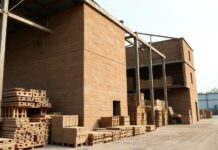Seeking to make the future of construction more environmentally friendly, snøhetta has partenered with norwegian startup saferock to develop a zero-carbon concrete, providing a more sustainable alternative to the widely established portland based concrete. the team has given value to various industrial residues and by-products, to create a low emission geopolymer concrete that will be produced on-site, eliminating both transport emissions and time, and thus providing a unique opportunity where mining waste has previously posed an environmental threat.
concrete is a major contributor to the carbon footprint of the building and construction industry, and according to the international affair think tank by chatham house, its key component — cement — is the source of about 8% of the world’s CO2 emissions. to reach the aim of the paris agreement, annual global CO2 emissions linked to concrete will need to decrease greatly within the next few years. as a response to this, the strategic partnership between snøhetta and saferock focuses on the production of a more sustainable geopolymer concrete, a manufactured molecular material made of waste minerals stemming from mining industries and power plants.
by utilizing industrial by-products to create geopolymer concrete, snøhetta and saferock estimate that carbon emissions associated with the production of concrete can be reduced by more than 70% as a first step. in fact, the team hopes to produce fully CO2 neutral concrete by 2025. furthermore, geopolymers showcase a series of properties that are superior to the ones of common portland cement, such as higher temperature and chemical resistance, and significantly lower permeability.




























